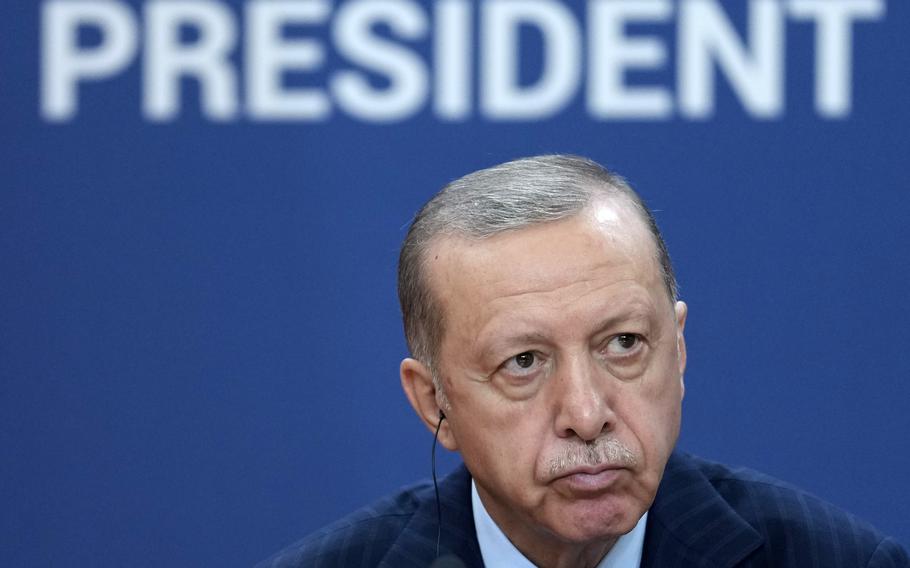
Turkey’s President Recep Tayyip Erdogan listens to his Serbian counterpart Aleksandar Vucic during a news conference in Belgrade, Serbia, Wednesday, Sept. 7, 2022. Erdogan arrived Tuesday in Serbia, as a part of his Balkan’s tour. (Darko Vojinovic/AP)
ISTANBUL - Turkey has arrested and deported hundreds of Syrian refugee men and boys this year, detaining them arbitrarily and forcing them to return to northern Syria, the New York-based Human Rights Watch said in a report released Monday.
The group, citing interviews with dozens of refugees, said Turkish officials “beat and abused most” of the refugees, before forcing them to cross the border into northern Syria at gunpoint.
The allegations, which the group said were a violation of international law, were the latest sign of a surging hostility toward Syrians in Turkey, and another grim turn for a country that once opened its borders to people fleeing Syria’s war and still hosts at least 4 million refugees and asylum seekers.
But over the past few years, segments of the public have blamed the refugees for a catalogue of woes in Turkey, including a stubborn economic downturn. Some opposition parties have seized on the anger, invoking anti-immigrant sentiments to garner support.
Turkey’s Interior Ministry, which is responsible for deportations, did not immediately comment on the allegations. Human Rights Watch quoted the head of Turkey’s migration agency, Savas Unlu, as calling the group’s finding “baseless” and saying Turkey is complying with national and international law.
The deportations, which occurred between February and July, “provide a stark counterpoint to Turkey’s record of generosity as host to more refugees than any other country in the world and almost four times as many as the whole European Union,” Human Rights Watch said.
President Recep Tayyip Erdogan, who is facing a critical election next year, has struggled to respond to the shifting public sentiment, publicly defending refugees but also vowing to resettle a million Syrians in opposition-held parts of northern Syria, in a move officials maintain would be voluntary.
The report said refugees were forced to sign forms that they were not allowed to read, but that they understood amounted to consent for “voluntary repatriation” to Syria. “Many said that they saw Turkish officials beat other men who had initially refused to sign, so they felt they had no choice,” the report said.
Turkey is obliged to “respect the principle of nonrefoulement, which prohibits the return of anyone to a place where they would face a real risk of persecution, torture or other ill-treatment, or a threat to life,” the report said, adding that Syria - divided between areas ruled by a government that has carried out mass human rights violations, and opposition-held areas still riven by conflict - “remains unsafe for returning refugees.”
Turkish authorities have rounded up and deported Syrian refugees on previous occasions over the past few years, including after local elections in 2019 in which voters expressed dissatisfaction with what some voters framed as Erdogan’s pro-refugee policies.
The current climate in Turkey has led to a rise in support for an anti-immigrant party and left Syrian refugees in a bind. As Turkey pursues a crackdown, causing many Syrians to consider fleeing the country, neighbors like Bulgaria and Greece have also been accused of using violent tactics to turn refugees back to Turkey.
Some of the refugees interviewed by Human Rights Watch were not deported but were released, the group said. Even so, those who were released “described life in Turkey as dangerous, saying that they are staying at home with their curtains closed and limiting movement to avoid the Turkish authorities.”